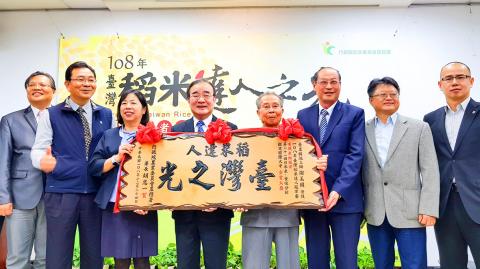The Council of Agriculture (COA) yesterday honored Taitung County rice farmer Hsieh Mei-kuo (謝美國) with a plaque that reads “Taiwan’s glory” for being the first Taiwanese to win gold at a rice competition in Japan.
More than 5,000 rice products from Japan and around the world competed in the annual International Contest on Rice Taste Evaluation in Kisarazu, Chiba Prefecture, from Nov. 30 to Dec. 1.
The 87-year-old Taiwanese farmer, who has grown rice for nearly six decades, won the award with his organic rice grown in Taitung’s Chihshang Township (池上).

Photo: Chien Hui-ju, Taipei Times
His rice breed, named Kaohsiung No. 147, features a light taro aroma and was cultivated by members of the COA’s Kaohsiung District Agricultural Research and Extension Station.
Producing a quality crop requires the subtle combination of good weather and unpolluted soil and water, as well as consistent human effort, Hsieh said.
Weather conditions can have a great effect on agricultural production, and farmers in Taitung have to contend with foehn winds that can ruin crops overnight, he said.
Hsieh added that for him, the knowledge needed to produce quality rice is more profound than that of calligraphy.
Ranked first in a contest against products from the US, Thailand, China and other nations, Hsieh’s rice qualified to compete against Japanese products, Agriculture and Food Agency Director-General Hu Jong-i (胡忠一) said.
In the contest with Japanese products, Hsieh’s rice received the second-largest number of votes and won a gold prize, he said.
As Japan highly values rice quality and flavor, Hsieh’s rice could be said to be among the world’s best, Hu said.
Taiwanese farmers had previously received only excellence awards, Hu added.
Last month, 1,140 tonnes of Taiwanese rice were sold to Japan, more than double the annual average in previous years, and 1,400 tonnes are expected to be sold to Japan next year, he said.
Taiwan last year produced up to 1.4 million tonnes of rice, with domestic consumption accounting for 1.2 million tonnes, Food Industry Division Director Lin Chuan-chi (林傳琦) said, adding that only a few thousand tonnes were organic.
To solve an overproduction problem, the agency has advised farmers to grow less and focus on higher-quality breeds, or to turn rice into snack products, while encouraging consumers to purchase domestic products, Hu said.

DEFENDING DEMOCRACY: Taiwan shares the same values as those that fought in WWII, and nations must unite to halt the expansion of a new authoritarian bloc, Lai said The government yesterday held a commemoration ceremony for Victory in Europe (V-E) Day, joining the rest of the world for the first time to mark the anniversary of the end of World War II in Europe. Taiwan honoring V-E Day signifies “our growing connections with the international community,” President William Lai (賴清德) said at a reception in Taipei on the 80th anniversary of V-E Day. One of the major lessons of World War II is that “authoritarianism and aggression lead only to slaughter, tragedy and greater inequality,” Lai said. Even more importantly, the war also taught people that “those who cherish peace cannot

STEADFAST FRIEND: The bills encourage increased Taiwan-US engagement and address China’s distortion of UN Resolution 2758 to isolate Taiwan internationally The Presidential Office yesterday thanked the US House of Representatives for unanimously passing two Taiwan-related bills highlighting its solid support for Taiwan’s democracy and global participation, and for deepening bilateral relations. One of the bills, the Taiwan Assurance Implementation Act, requires the US Department of State to periodically review its guidelines for engagement with Taiwan, and report to the US Congress on the guidelines and plans to lift self-imposed limitations on US-Taiwan engagement. The other bill is the Taiwan International Solidarity Act, which clarifies that UN Resolution 2758 does not address the issue of the representation of Taiwan or its people in

US Indo-Pacific Commander Admiral Samuel Paparo on Friday expressed concern over the rate at which China is diversifying its military exercises, the Financial Times (FT) reported on Saturday. “The rates of change on the depth and breadth of their exercises is the one non-linear effect that I’ve seen in the last year that wakes me up at night or keeps me up at night,” Paparo was quoted by FT as saying while attending the annual Sedona Forum at the McCain Institute in Arizona. Paparo also expressed concern over the speed with which China was expanding its military. While the US

‘FALLACY’: Xi’s assertions that Taiwan was given to the PRC after WWII confused right and wrong, and were contrary to the facts, the Ministry of Foreign Affairs said The Ministry of Foreign Affairs yesterday called Chinese President Xi Jinping’s (習近平) claim that China historically has sovereignty over Taiwan “deceptive” and “contrary to the facts.” In an article published on Wednesday in the Russian state-run Rossiyskaya Gazeta, Xi said that this year not only marks 80 years since the end of World War II and the founding of the UN, but also “Taiwan’s restoration to China.” “A series of instruments with legal effect under international law, including the Cairo Declaration and the Potsdam Declaration have affirmed China’s sovereignty over Taiwan,” Xi wrote. “The historical and legal fact” of these documents, as well